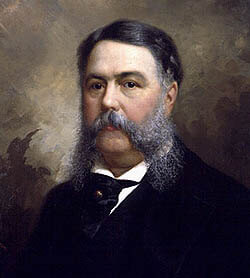
Introduction:
In the annals of American history, some presidents shine brightly, while others, like Chester Alan Arthur, the 21st President of the United States, are less remembered. Yet, Arthur’s contributions, particularly in strengthening the U.S. Navy, were pivotal in shaping the country’s future.
This blog post, inspired by PBS’s extensive collection on American Presidents, delves into Arthur’s presidency and his unheralded role in fortifying America’s naval power.
Early Presidency: Chester Alan Arthur, a product of the New York political machine, ascended to the presidency in 1881 following the assassination of President James Garfield. Known for his integrity and honesty, Arthur’s administration was characterized by surprising reformative actions, especially considering his roots in political patronage.
Civil Service and Domestic Policy: Arthur’s commitment to reform was evident in his domestic policies. He signed the Pendleton Civil Service Reform Act, revolutionizing federal employment by prioritizing merit over political allegiance. His veto of pork barrel expenditures reflected a fiscally responsible approach, even as he indulged in refurbishing the White House with the creative touch of Louis Comfort Tiffany.
Foreign Affairs and Naval Expansion: Arthur’s presidency is notable for its impact on foreign relations and naval development. His efforts to lower tariffs and negotiate trade agreements demonstrated a progressive approach to international economics. However, his most enduring legacy lies in his vision for a modern U.S. Navy. Recognizing the strategic importance of naval power, Arthur championed the development of a fleet with steam-powered engines and steel cladding, a significant advancement from the wooden ships of prior eras.
Presidential Politics and Legacy: Arthur’s rise to the presidency, initially seen with skepticism, turned into a narrative of surprising integrity and dedication to public service. His battle against his political patron, Senator Roscoe Conkling, and his governance despite a fatal kidney disease diagnosis, showcased his resilience and commitment to the nation’s welfare.
Conclusion: Chester Alan Arthur’s presidency, often overlooked in the broader tapestry of American history, was a period of significant transition and modernization, especially for the U.S. Navy. His contributions laid the groundwork for America’s emergence as a major naval power in the 20th century. As Americans, we owe a part of our naval strength and international standing to this often-forgotten president, a testament to the lasting impact of Arthur’s administration.

